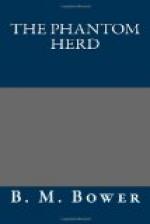“What about our range picture?” Andy Green began anxiously.
Luck choked back an oath because of Andy’s wife. “Ah—they’re married to the idea that this rot is what sells best. They don’t know what a real Western picture is: they never saw one. And they’re afraid to take a chance. I was in hopes—but Mart’s the big chief, you know. He’d gone and loaded up with this trash, and so he couldn’t see my story at all. I get his viewpoint, all right; he’s keen to pry off some real money, and he’s afraid to experiment with new tools. But it does seem pretty raw to put you boys working on this cheap studio stuff after getting you out here to do something worth while.”
“We’re to stay right here, then?” Weary spoke the question that was in the minds of all of them.
“That’s the present outlook,” Luck confessed with bitterness. “I don’t need real country for this junk. I was all primed to show him where I’d have to take my company to New Mexico, but I didn’t say anything about it when he sprung this Bently Brown business. This will all be made right here at the studio and out in Griffith Park.”
Down deep in Luck’s heart there was a hurt he would not reveal to any one. It was built partly of disappointment and an honest dislike for doing unworthy work; it had in it also some personal chagrin at being compelled to put the Happy Family at work in the very class of pictures he had often ridiculed in his talk with them, after bringing them all the way from Montana so that he might produce his big range picture. He stood looking somberly at the set which Clements had planned to save time—and therefore dollars—for the Acme Company. He thought of his range story, as it had first grown out of the night away up there in the plains country; he thought of how he had hurried so that he might the sooner make the vision a reality; how he had talked of it confidently to these men who had listened with growing enthusiasm and interest, until his vision had become their vision, his hopes their hopes.
They had left the Flying U and come with him to help make that big picture of the range. By their eager talk they had helped him to strengthen certain scenes; they had even suggested new, original material as they told of this adventure and that accident, and argued—as was their habit—ever scenes and situations. That was why Andy had spoken of it as their picture. That was why they were here; that was what had brought them early to the studio. And in his hand he held a half dozen or more of those cheap, lurid stories he had always despised; they must let the public see their faces in these impossible, illogical situations, or they must go back and call Luck Lindsay names to salve their disappointment.
The dried little man—whose name was Dave Wiswell—came walking curiously up the fresh-made “street,” his sharp eyes taking in the falsity of the whole row of shack-houses that had no backs; bald behind as board fences, save where two-by-fours braced them from falling. He saw the group standing before a wall that purported to be the front of a bank (which would be robbed with much bloodshed in the second scenario) and he hurried a little. Luck scowled at him preoccupiedly, nodded a good morning, and turned abruptly to the others.




